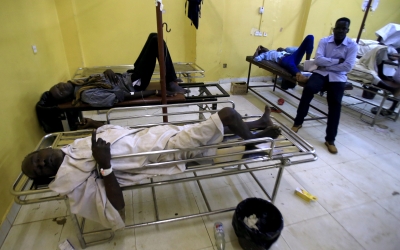Coronavirus: Sudan issues nationwide curfew to combat spread of virus

Authorities in Sudan have said night curfews will begin on Tuesday in an attempt to stop the spread of the coronavirus.
The move comes after the country recorded its second case of the disease, officially known as Covid-19, last Friday. One person is confirmed to have died from the disease.
A member of Sudan's transitional council said on Monday that the nationwide curfew would last from 8pm to 6am. The country will also stop any long-distance bus trips between various cities, beginning at 6pm.
The only exclusions for the restrictions in place are humanitarian, commercial and technical support shipments, according to a spokesman for the ruling council, who have been in charge of the country since the ousting of longtime leader Omar al-Bashir.
"All the state's capabilities will be at the disposal of the committee to fight coronavirus," Abdel Fattah al-Burhan, the head of transitional council, told a press conference.
Burhan was referring to a committee made up of cabinet members and sovereign council members that has been tasked with fighting coronavirus.
Sudan declared a public health emergency last week and has already closed all airports, ports and land crossings.
While the number of cases in Sudan is relatively low, the virus has swept across much of the Middle East and North Africa.
Most countries in the region have implemented some forms of restrictions, including curfews, travel bans, restrictions on movement and closures of businesses and schools.
Africa had been relatively spared from the rapid spread of the coronavirus, which has infected at least 332,930 and killed 14,510 worldwide, according to the latest figures from the World Health Organisation.
The majority of the continent's cases have involved foreigners or people who had travelled abroad. But concerns are growing about whether certain countries will be able to handle the disease.
Middle East Eye delivers independent and unrivalled coverage and analysis of the Middle East, North Africa and beyond. To learn more about republishing this content and the associated fees, please fill out this form. More about MEE can be found here.





